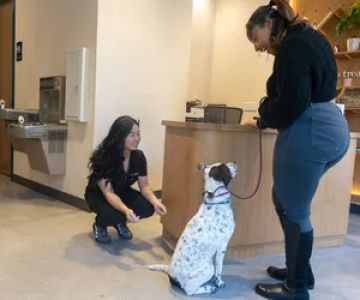What Does a Veterinary Assistant Do? Exploring Their Role and Responsibilities
If you’ve ever wondered what a veterinary assistant does, you're not alone. These professionals play a crucial role in animal care and support veterinarians in providing the best treatment possible. Whether you're considering a career as a veterinary assistant or you're simply curious about the responsibilities of one, this article will break down the role and highlight the key tasks that make these professionals essential in a veterinary clinic or hospital.

2510 N Milwaukee Ave, Chicago, IL 60647, USA
See Details1. Overview of a Veterinary Assistant's Role
A veterinary assistant's primary role is to assist veterinarians and veterinary technicians with various tasks related to animal care. These tasks can include preparing animals for examinations, assisting in surgeries, administering medications, and managing patient records. Veterinary assistants also interact directly with pet owners, answering questions and providing guidance on care instructions.
The job is incredibly diverse, and the duties can vary based on the clinic's size and focus. Some veterinary assistants work in general practice clinics, while others may be in specialized areas such as emergency care or animal rehabilitation. Their work is essential to the smooth operation of veterinary facilities, and they provide both hands-on care and administrative support to ensure animals receive the best treatment possible.
2. Daily Duties and Responsibilities
The daily tasks of a veterinary assistant can range from administrative duties to hands-on care of animals. Some of the most common duties include:
- Assisting in physical exams of animals
- Administering medications as prescribed by the veterinarian
- Preparing and maintaining surgical instruments
- Cleaning and sterilizing animal enclosures
- Monitoring animal health and behavior
- Maintaining and organizing patient records
- Helping with the euthanasia process in some cases
- Providing post-surgery care to animals
Veterinary assistants are trained to handle both the medical and emotional aspects of animal care. They may need to comfort anxious pets and their owners while also being able to perform technical tasks such as taking blood samples or assisting in dental cleanings.
3. Skills Required for a Veterinary Assistant
To be successful as a veterinary assistant, certain skills and traits are crucial. These include:
- Strong communication skills: Veterinary assistants must be able to explain medical information to pet owners in an easy-to-understand way while maintaining empathy and professionalism.
- Attention to detail: With the health and safety of animals at stake, veterinary assistants must be meticulous in their work, especially when handling medications, medical records, and surgical instruments.
- Physical stamina: The role often requires standing for long periods, lifting animals, and performing tasks that require manual dexterity.
- Knowledge of animal care: Having a foundational understanding of animal behavior, anatomy, and common medical conditions is crucial for assisting veterinarians effectively.
- Time management: Veterinary assistants work in fast-paced environments and must manage their time efficiently to handle multiple tasks at once.
While formal education is beneficial, many veterinary assistants learn the necessary skills on the job or through a certification program. These programs typically cover topics like animal anatomy, clinical practices, and veterinary terminology.
4. Veterinary Assistants and Animal Health Care
Veterinary assistants play a vital role in ensuring that animals receive high-quality care throughout their visits. In addition to their clinical responsibilities, they often work closely with veterinarians to help develop treatment plans and ensure animals are comfortable during their time at the clinic. They may also provide pet owners with instructions on how to care for their pets at home after treatment.
For example, when an animal undergoes surgery, the veterinary assistant will help prepare the animal, monitor its recovery, and ensure it receives the prescribed medication. They also help educate pet owners on the signs to watch for after surgery, such as potential complications or signs of discomfort.
5. Career Path and Job Outlook for Veterinary Assistants
For those interested in pursuing a career in animal care, becoming a veterinary assistant can be an excellent starting point. While formal education is not always required, having a diploma or degree in animal science, veterinary technology, or a related field can be beneficial. Some veterinary assistants also pursue certification through organizations such as the National Association of Veterinary Technicians in America (NAVTA), which can increase job prospects and earning potential.
The job outlook for veterinary assistants is strong, with a steady demand for these professionals as pet ownership continues to rise. According to the U.S. Bureau of Labor Statistics, employment of veterinary technicians and technologists (which includes veterinary assistants) is projected to grow by 16% from 2019 to 2029, much faster than the average for all occupations.
6. The Emotional Aspect of Being a Veterinary Assistant
While being a veterinary assistant can be incredibly rewarding, it also comes with emotional challenges. Working with animals means you will often be dealing with sick or injured pets, and sometimes, the outcome may not be positive. A veterinary assistant must possess emotional resilience and empathy, as they are often the first point of contact for distressed pet owners.
Additionally, some veterinary assistants may assist in euthanasia procedures, which can be emotionally difficult. However, many find solace in knowing that they are helping to ease the suffering of pets in their final moments, providing comfort to both the animal and their owners.
Conclusion: The Value of Veterinary Assistants
Veterinary assistants are indispensable to the animal care industry. Their diverse responsibilities, ranging from clinical tasks to customer service, make them vital in providing high-quality care for animals. Whether you’re considering a career as a veterinary assistant or you simply want to learn more about what they do, it’s clear that these professionals are essential in keeping veterinary clinics running smoothly and ensuring animals receive the care they need.
If you’re passionate about animals and want to make a difference in their lives, becoming a veterinary assistant might be the perfect career path for you. With a growing job market and the opportunity to make a real impact on animal health, it’s a profession worth considering. Explore educational programs and certifications that can help you take the first step toward this fulfilling career.
SEO Title: Understanding the Role of a Veterinary Assistant: Responsibilities and Skills SEO Keywords: veterinary assistant, animal care, veterinary career, pet health, veterinary assistant responsibilities SEO Description: Learn what a veterinary assistant does, the skills required, and the career outlook for this vital role in animal care. Discover how you can become a veterinary assistant today.









